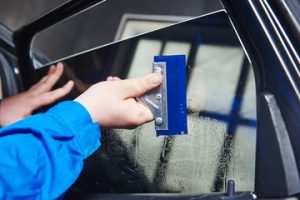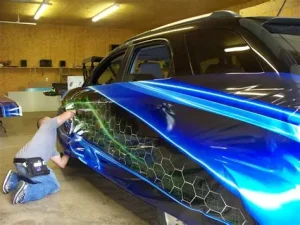Window tint is more than just an aesthetic upgrade; it also provides benefits such as shattered glass prevention, UV protection, and glare reduction. However, it’s important to choose a professional service that understands your state’s regulations and offers a range of shade options.

Effective window tints block infrared rays, which keep your vehicle or home cooler and less cluttered. They can also lighten the load on air conditioning systems, which helps to reduce energy bills. Click Here to learn more.
Infused dyes give inexpensive window tint its classic color and glare reduction. However, dyed films fade or turn purplish over time and are more prone to peeling and bubbling than higher-end tints. This means you’ll need to re-tint your windows sooner than you would with a premium film. The good news is that both types of tint provide great heat rejection, UV protection, and privacy, so a dyed film is still a decent option if you’re on a tight budget or simply don’t care about the appearance of your vehicle’s interior.
The most noticeable difference between high-end ceramic and traditional tints is their durability, which allows them to resist fading, bubbling, and discoloration even after years of continuous sun exposure. In addition, ceramic tints block a substantial amount of infrared energy and nearly all harmful UV rays, keeping your car’s cabin noticeably cooler during long drives across Georgia’s sunny highways.
Unlike metalized tints, which contain minute metallic particles, ceramic films don’t interfere with electronic signals from GPS, AM/FM radios, and cell phones. As a result, you can enjoy seamless connectivity on every drive. Compared to traditional tints, ceramic films also have more consistent glare reduction, which helps you stay focused during bright sunrise and sunset commutes.
If you’re looking for the ultimate tint that offers top-tier performance, look no further than ceramic film. This cutting-edge technology uses advanced nano-ceramic particles embedded in a clear polyester base to block up to 90% of infrared energy and harmful UV rays. As a result, your car’s cabin can be up to 15-30degF cooler on the hottest days and help you save significant money on fuel consumption over time.
While many drivers choose tints based on their initial cost, the most important consideration should be your driving needs and preferences. Opting for a cheap tint that only provides basic temperature control and privacy may be an expensive mistake in the long run. If you want the best performance, invest in a premium tint that offers superior heat rejection and UV protection, which will save you money and keep your vehicle’s interior looking new for years to come.
Ceramic
Ceramic tints are renowned for their superior heat rejection and can reduce interior temperatures by up to 50%, enhancing comfort and energy efficiency. They also block 99% of harmful UV rays, safeguarding skin and reducing fading of vehicle or home furnishings. The higher level of protection is a major benefit for consumers who prioritize safety and longevity.
In addition to their durable construction, ceramic films resist fading and scratching, making them a cost-effective long-term investment. They are also non-reflective, preventing glare and interference with electronic devices. This can be beneficial for drivers who need to use GPS and mobile phone devices while on the go.
Unlike metallic window tints, ceramic films do not interfere with radio frequencies and radar signals. This makes them an ideal choice for vehicles and homes with sensitive electronics. However, it’s important to consider potential signal interference when deciding on which type of tint to purchase.
The ceramic construction of these tints requires careful handling, as excessive heat or moisture can cause damage. Cracking, hazy film and edge gaps are common issues that can detract from the overall appearance of ceramic tints. These problems can be avoided by choosing a professional installer with extensive training and precision tools.
Tinting issues often arise as a result of environmental and climate changes that stress the film’s material. A quality window tint with high endurance against thermal fluctuations is essential to minimize these issues. Incorrect installation can also contribute to tint failure, such as bubbles or peeling. Identifying the specific issue and seeking expert advice can ensure that any problems are resolved quickly and efficiently.
In addition to selecting the right tint for your needs, it’s essential to comply with local laws regarding acceptable levels of darkness for automotive tints. Some regions have restrictions concerning the amount of light that can pass through a vehicle’s windows, and failing to follow these regulations can lead to fines or even removal of the tint. It’s also important to familiarize yourself with the different tint options and the benefits they offer before deciding which type is best for your vehicle or home.
Metalized
The type of tint you choose will impact your vehicle’s comfort, appearance and functionality. Each option caters to a specific need, such as privacy, cost and heat rejection, with some types of tint offering superior durability and performance.
Generally, window tint is dark to reduce sunlight and glare that can cause discomfort inside your vehicle. However, it is important to check the local laws regarding the amount of darkness allowed, known as variable light transmission (VLT). Failure to adhere to these regulations could result in fines and the need to remove your tint.
Dyed window tint is a cheap and popular option, as it uses a dye to absorb solar heat while reducing glare. This film type can also help prevent fading of interior upholstery and dash panel materials. However, it can have limitations, including a faded appearance after prolonged sun exposure and interference with GPS, radio and cellphone signals.
Metalized window tints contain metallic particles to reflect the sun’s heat, reducing interior temperatures and increasing energy efficiency. These films are typically more durable than dyed tints and offer better protection against harmful UV rays. The metallic particles, however, can interfere with electronic signals, which may be a concern for some motorists.
Hybrid window tint combines the best aspects of dyed and metalized tints. These films are designed to be durable and shatter-resistant while still allowing for a high level of visibility. They can also reduce heat penetration and block up to 99% of damaging UV rays, making them a good choice for those looking for an alternative to traditional dyed or metallic options.
Ceramic window tint is the highest-performing type of car window tint. This clear film is made from non-conductive ceramic particles and offers excellent clarity while blocking 99% of damaging UV rays. Unlike metalized and hybrid tints, ceramic doesn’t interfere with electronic signals, making it a great choice for tech-savvy consumers.
Regardless of the tint type you decide to use, it’s essential to consider professional installation. A certified installer will have the experience and tools to ensure a flawless application, free from bubbles and peeling. They will also be familiar with local laws and regulations, ensuring compliance and potentially saving you from costly fines.
High-Performance
Aside from enhancing your vehicle’s aesthetic appeal, premium tints also protect you and your passengers. Most importantly, window tints block a significant amount of harmful UV rays that can cause skin cancer and other skin issues. This is particularly important if you drive for long periods of time or frequently take road trips.
Window tint also minimizes glare, making it easier to see the road ahead and reduces eye strain during long drives. This can improve driving comfort and turn a stressful commute into a pleasant journey. Additionally, tinted windows can deter thieves by making it difficult for prying eyes to see what’s inside your vehicle. This added level of security can make a big difference when parking your vehicle in high-traffic areas or public places.
Premium tints are manufactured with advanced materials that manage solar energy through a process of reflection, absorption, and transmission. Different film options have varying percentages of visible light transmission, which is what determines how dark the tint appears. The best-performing tints are ceramic or nano-ceramic. These films use cutting-edge technology to offer superior heat rejection and UV protection, as well as a sleek appearance. Additionally, they don’t interfere with electronic signals like GPS or radios, which is ideal for tech-reliant drivers.
While a high-quality tint offers many benefits, the most important consideration is how it affects your comfort and safety. The right tint will reflect your personal preferences and serve a vital purpose, whether it’s providing privacy, reducing glare, or protecting against UV rays.
If you are interested in upgrading your vehicle’s appearance, look no further than Llumar’s premium window tint options. We offer a variety of shades that comply with your state’s window tinting laws, ensuring your vehicle is legally visible. Moreover, our tints are manufactured with high-performance materials that resist fading and are covered by a lifetime warranty. Additionally, our installers are trained and experienced, delivering bubble-free application and flawless finishes for a professional finish that boosts your vehicle’s curb appeal. To learn more about our window tinting options, contact us today. We’ll be happy to provide a free estimate and show you how we can transform your car’s interior.
